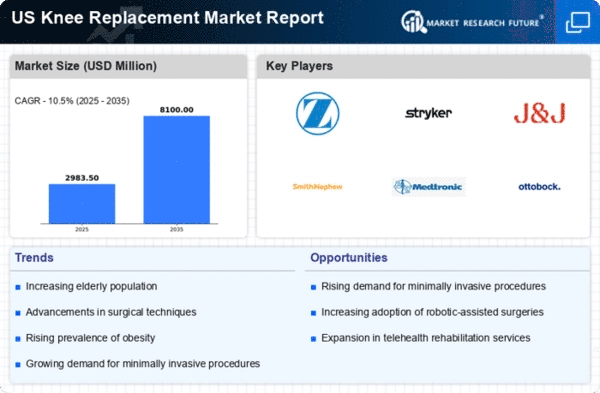Rising Healthcare Expenditure
The upward trend in healthcare expenditure in the US is likely to have a profound impact on the knee replacement market. As healthcare spending continues to rise, more resources are allocated towards orthopedic procedures, including knee replacements. In 2025, healthcare spending is projected to reach approximately $4.5 trillion, with a significant portion directed towards surgical interventions. This increase in funding may facilitate better access to knee replacement surgeries for patients, particularly those who may have previously faced financial barriers. Additionally, as insurance coverage expands and reimbursement rates improve, more individuals may opt for knee replacement procedures, further driving market growth. The correlation between healthcare expenditure and surgical interventions suggests a promising outlook for the knee replacement market.
Increased Awareness and Education
There is a growing awareness and education regarding knee health and the benefits of knee replacement surgeries, which appears to be a significant driver for the knee replacement market. Healthcare campaigns and patient education initiatives are informing individuals about the options available for managing knee pain and mobility issues. This increased awareness is likely leading to more patients seeking consultations and considering knee replacement as a viable solution. Moreover, as patients become more informed about the advancements in surgical techniques and post-operative care, they may be more inclined to pursue these procedures. This trend is expected to contribute to a steady increase in the demand for knee replacements, thereby positively impacting the market.
Advancements in Surgical Techniques
Innovations in surgical techniques and technologies are significantly influencing the knee replacement market. Minimally invasive procedures, robotic-assisted surgeries, and enhanced recovery protocols are becoming increasingly prevalent. These advancements not only improve surgical outcomes but also reduce recovery times, which is appealing to both patients and healthcare providers. For instance, robotic-assisted knee surgeries have been shown to enhance precision, potentially leading to better alignment and longevity of implants. As a result, the market is witnessing a shift towards these advanced surgical options, which may contribute to an increase in the number of procedures performed annually. The adoption of these technologies is likely to enhance patient satisfaction and outcomes, further propelling the growth of the knee replacement market.
Rising Prevalence of Osteoarthritis
The increasing incidence of osteoarthritis among the aging population appears to be a primary driver for the knee replacement market. As individuals age, the likelihood of developing osteoarthritis escalates, leading to a higher demand for knee replacement surgeries. In the US, it is estimated that approximately 27 million adults are affected by osteoarthritis, with knee joints being the most commonly impacted. This condition often results in chronic pain and mobility issues, prompting patients to seek surgical interventions. Consequently, the knee replacement market is experiencing growth as healthcare providers respond to this rising need. Furthermore, the financial burden associated with untreated osteoarthritis, which can lead to increased healthcare costs, may further incentivize patients to opt for knee replacement procedures, thereby driving market expansion.
Aging Population and Active Lifestyles
The demographic shift towards an aging population, coupled with a desire for active lifestyles, appears to be a crucial driver for the knee replacement market. As the baby boomer generation ages, there is an increasing number of individuals seeking to maintain their mobility and quality of life. Many older adults are prioritizing physical activity, which can lead to wear and tear on knee joints, necessitating surgical intervention. This trend is particularly evident in the US, where a significant portion of the population is over 65 years old. The desire to remain active and engaged in daily activities is likely to drive demand for knee replacements, as individuals seek solutions to alleviate pain and restore function. Consequently, this demographic trend is expected to contribute to the sustained growth of the knee replacement market.
















